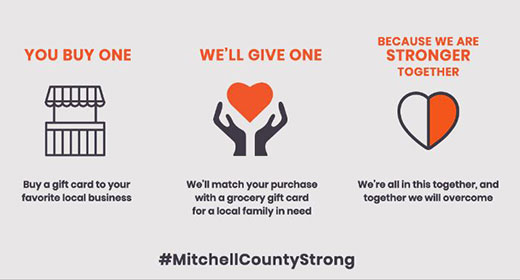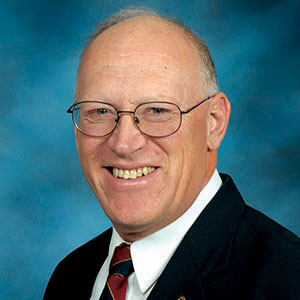
Mitchell County Strong | Download this image
Kansas Profile – Now That’s Rural: Heather Hartman, Mitchell County Strong
Nov. 25, 2020
By Ron Wilson, director of the Huck Boyd National Institute for Rural Development at Kansas State University.
“Hungry Hungry Heroes.” Hmm, that sounds like the game called Hungry Hungry Hippos. This variation on that name is one example of the creative ways that leaders in Mitchell County supported their communities during the pandemic with a collaboration called Mitchell County Strong.
Heather Hartman is Mitchell County director of community development. A Beloit native, she had been a small business owner in Mitchell County before becoming county community development director in 2012.
“When the pandemic hit, it was scary,” Heather said. “There were projections that 30% of locally owned small businesses would close.” Heather’s office in Beloit is co-located with two other offices: the Chamber of Commerce and the community foundation. “Each of us was a separate organization, but what we did would never have happened if we weren’t all here together,” Heather said.
As shutdown orders were being issued, the three directors of these units immediately met to discuss what could be done. “Our main goal was to help these businesses and nonprofit organizations stay afloat,” Heather said.
One of their board members had heard from Manhattan Running Company about Manhattan’s gift certificate program and disaster recovery fund through the Manhattan Community Foundation. These women decided to try something similar.
They launched a “Buy 1, Give 1” initiative through which people could buy a gift certificate to a store in Mitchell County, and MCS would match it with a grocery gift card to be donated to a local family in need. The initiative took off.
“We were trying to think of a name for this, and somebody posted a comment about how we were trying to keep Mitchell County strong,” Heather said. That became the name.
Mitchell County Strong, or MCS, became the title of this collaboration between the Solomon Valley Community Foundation, the Beloit Area Chamber of Commerce, and Solomon Valley Economic Development.
The gift card purchases immediately put much-needed revenue into local businesses and helped families who were struggling. “We sold more than $10,000 of gift cards in the first three days,” Heather said.
Other people wanted to help directly. A disaster relief fund was established at the community foundation. “Based on the advice we received from the ministerial alliance, we kept the application process really simple, and it worked,” Heather said.
MCS also recognized the need for businesses to use online marketing due to the pandemic. “Lots of our local businesses didn’t even have a website,” Heather said. The coalition organized an online store on which customers could buy gift cards from local businesses. MCS also offered a grocery assistance program plus mini-grants for local nonprofit organizations.
A local auctioneer with Hansen Auction Company agreed to conduct an online auction to benefit the project, while waiving the selling fee and donating the buyers’ fees to the disaster recovery fund.
MCS programs were county-wide, supporting stores in the county seat of Beloit plus rural communities such as Cawker City, population 469, Glen Elder, population 427, and Tipton, population 210 people. Now, that’s rural.
Mitchell County Strong wanted to honor frontline workers, so its organizers invited the public to nominate a deserving person to receive a free lunch weekly. As a play on the Hungry Hungry Hippos name, they called the program Hungry Hungry Heroes.
“We thought people would nominate doctors and EMTs, but they also nominated their trash workers and grocery store clerks, which was great,” Heather said. MCS delivered a meal to a different winner each week.
A beautiful promotional video about Mitchell County was already being developed and is posted on the website.
Ultimately, the project generated more than $53,000 in gift card sales, $52,000 from the online auction, and $48,000 in partnership support. “We got more than $150,000 into the hands of our local citizens and businesses,” Heather said. Other than one early retirement, not a single local small business has been lost.
For more information, go to www.mitchellcountystrong.com.
Hungry Hungry Heroes. That’s one example of a creative program to support community citizens. We commend Heather Hartman and her partners in Mitchell County who are making a difference with their creativity and commitment. They are Helping Helping Heroes.
Audio and text files of Kansas Profiles are available at http://www.kansasprofile.com. For more information about the Huck Boyd Institute, interested persons can visit http://www.huckboydinstitute.org.
-----------
The mission of the Huck Boyd National Institute for Rural Development is to enhance rural development by helping rural people help themselves. The Kansas Profile radio series and columns are produced with assistance from the K-State Research and Extension Department of Communications News Media Services unit. A photo of Ron Wilson is available at http://www.ksre.ksu.edu/news/sty/RonWilson.htm. Audio and text files of Kansas Profiles are available at http://www.kansasprofile.com. For more information about the Huck Boyd Institute, interested persons can visit http://www.huckboydinstitute.org.


